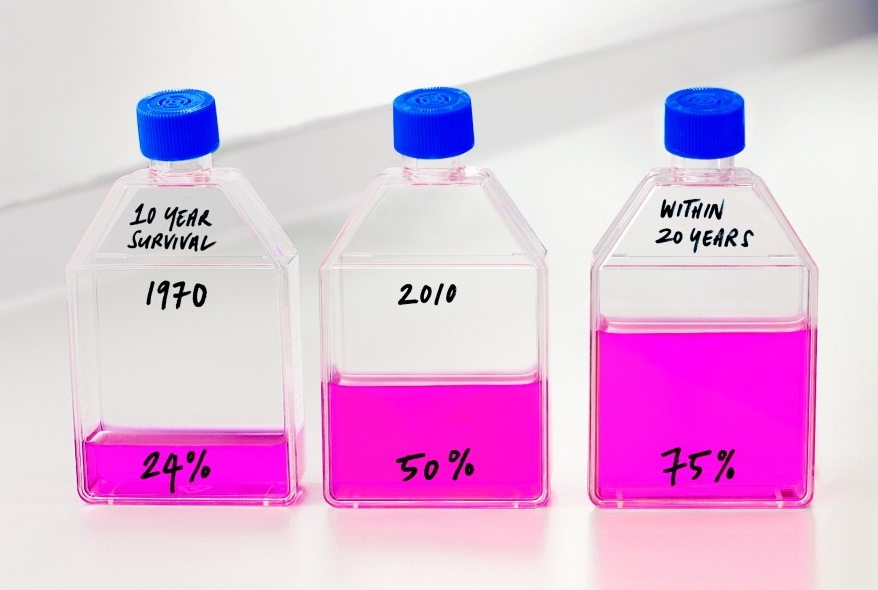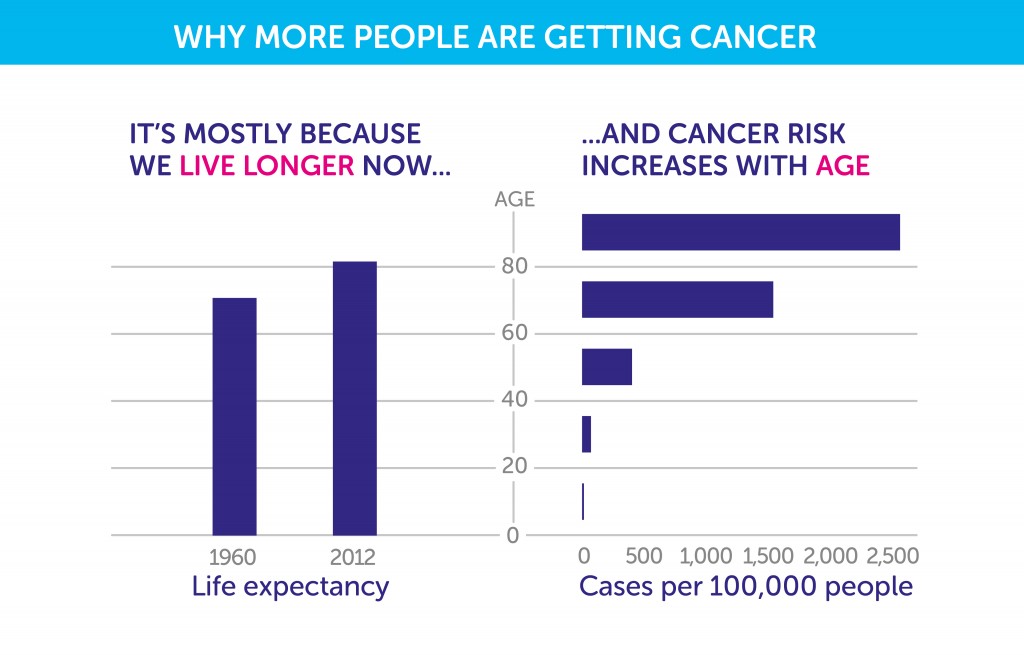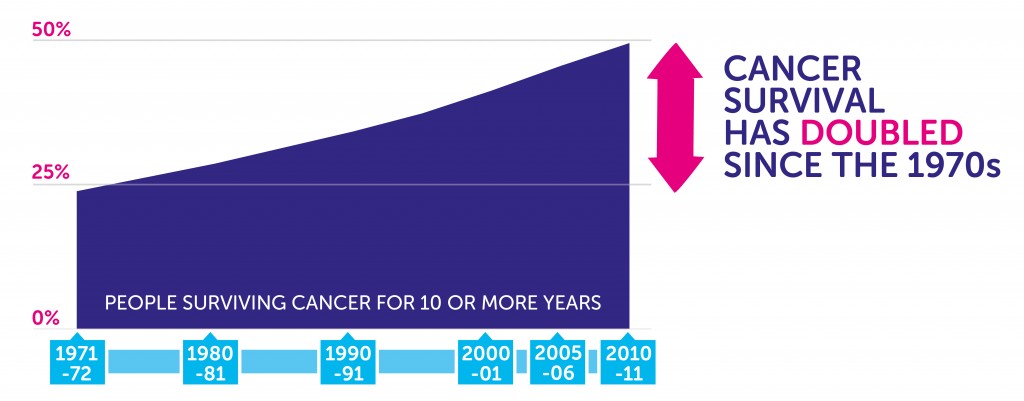Cancer is on the rise
It is still here, and it is still strong.
Half of us will hear the words “you have cancer” at some point in our lives. This is a solemn reminder of the challenge we face in beating this disease.
Has there been progress?
Yes.
More people are beating cancer today than ever before; survival has doubled in the last 40 years. Half of people diagnosed will now survive their cancer for more than 10 years, an all-time high.
Cancer affects all of us
Despite the undeniable progress, we need to talk about the scale of the problem. Previously, we’ve calculated that more than one in three would develop cancer at some point during their life.
But the latest research from Cancer Research UK now puts those chances at 1 in 2.
Let’s be clear – there hasn’t been a sudden spike in cancer risk.
The new numbers are down to a change in the method used to make the calculation. But they also reveal a gradual increase in risk over several decades.
Why is our risk increasing?
By far the biggest risk factor for most cancers is simply getting older.
More than three-quarters of all people diagnosed with cancer in the UK are over the age of 60.
This is because cancer is a disease of our genes – the bits of DNA code that hold the instructions for all the microscopic machinery inside our cells. Over time, mistakes accumulate in this code and it’s these faults that can kick start a cell’s journey towards becoming cancerous.
The longer we live, the more time we have for these errors to build up.
In the UK, more people than ever are reaching an age where they have a higher risk of developing cancer.
You can stack the deck
“More than four in ten cancers diagnosed each year in the UK could be prevented by changes in lifestyle – that’s something we can all aim for personally so that we can stack the odds in our favour.”
– Harpal Kumar, Cancer Research UK chief executive
Researchers believe that around two-thirds of the increase in cancer risk is due to longevity. The rest of the statistics in shifting cancer rates fall across different age groups. And when we look at these changes in detail, we can see the importance of our lifestyle choices.
For example…
Diets high in red and processed meats have contributed to rises in bowel cancer. More people are becoming obese in the UK, which raises the risk of developing a number of cancers. Our culture of sunbathing and using sunbeds is contributing to rising rates of melanoma (skin cancer).
For women, breast screening has meant we’re detecting more cancers at a younger age. But the increase in breast cancer rates is also down to changes in our lifestyles: women have fewer babies later, and breastfeed less.
Things are changing for men, too.
The introduction of prostate testing has led to an increase in the number of prostate cancers diagnosed. Many of these cases could well have gone undetected. Indeed, they may have never caused harm in these men’s lifetimes.
But these increases need to be offset against one huge, dramatic decrease.
Smoking remains the largest preventable cause of cancer in the world.
It is responsible for more than one in four UK cancer deaths, and nearly a fifth of all cancer cases. But fewer men are now smoking. Lung cancer rates are falling. Yet the rise in smoking among women compared to men means that their rates of smoking-related cancers are still increasing.
Rates of certain other cancers have fallen, however. For example, stomach cancer is much less common than it used to be, most likely because of changes to how we prepare food, coupled with falling rates of infection.
Not to mention the NHS screening programme, which has almost certainly prevented an epidemic of cervical cancer.
Collective effort
It’s important to emphasise that there hasn’t been a sudden jump in lifetime cancer risk overnight. The new method shows that the rise has been gradual, and follows the same trend of increasing life expectancy.
Importantly, cancer survival is showing the same pattern.
40 years ago, 1 in 4 people survived the disease for at least 10 years. Today, that figure is 2 in 4.
Cancer Research’s ambition is to accelerate progress so that 3 in 4 people survive within the next 20 years.
But far too many lives are still lost to cancer.
That’s why they’re committing to solving this challenge by significantly increasing investment in earlier diagnosis, as well as;
· increasing efforts in cancers of unmet need, such as lung and oesophageal cancer;
· continuing to develop personalised approaches to prevention, screening and treatment;
· working towards the first tobacco free generation;
· ensuring that every patient is well-informed and knows their choices.
Tackling cancer has to be a collective effort.
Research has shown us the impact that a healthy lifestyle can have – as well as the role chance plays in our risk of getting cancer.
As individuals, we can stack the odds in our favour by not smoking, maintaining a healthy weight, being more active and drinking less alcohol. We can also get to know our bodies so we can spot any unusual or persistent changes early on.
But it’s not just about individuals.
Politicians have an important role to play in supporting NHS cancer services, making sure patients have access to the best treatments, supporting public health measures to keep smoking rates in decline, and tackling obesity.
We need to make sure doctors have the right tools and support to recognise the signs and symptoms of cancer, and refer the right patients for further tests as early as possible.
And, finally, we need our researchers to continue asking questions. We need them to keep searching for answers, and we need them to keep making the breakthroughs that will save lives.
For more information on how we can beat cancer sooner, please visit http://www.cancerresearchuk.org
For the past three years, I have been a Board Member for the Catalyst Club, a pioneering venture of Cancer Research UK. Its goal is to raise £10 million towards personalised cancer treatment. Last year, I lost two people to cancer. I can see the impact the Catalyst Club is having on shaping the future of cancer research, diagnosis, treatment and prevention. For more information on the Catalyst Club visit www.cruk.org/the-catalyst-club.
We are all affected by cancer. Please consider how you can play a part in the fight against this terrible disease.




A simple summary about cancer, always a good reminder. Thanks Rob!